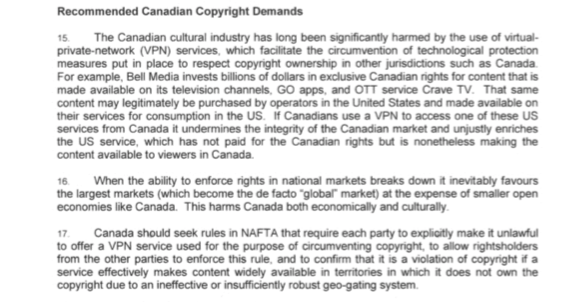Image: Shutterstock
Bell, one of Canada’s “big three” telecom companies, asked the Canadian government to seek rules that would make some VPN services illegal ahead of North American Free Trade Agreement (NAFTA) negotiations.Virtual Private Networks, or VPNs, are tools that obfuscate internet traffic so that internet service providers and other snoops can’t easily decipher your browsing habits.VPNs are a pillar of privacy-conscious internet usage, and are regularly used by journalists, researchers, and citizens seeking to circumvent censorship in places such as China. VPNs may also be used to circumvent geo-blocked content—say, to access regional Netflix content by pretending you’re based in a country other than the one you’re in. Netflix has recently cracked down on the use of VPNs in this manner.Anja Karadeglija, the editor of telecom news outlet the Wire Report, obtained Bell’s NAFTA submission from July 2017 via an access to information request, and shared it with Motherboard.In its submission, Bell argued that Canadians accessing content from a US service with a VPN “unjustly enriches the US service, which has not paid for the Canadian rights” but nonetheless makes that content available to Canadians. Bell’s media arm reportedly spends millions on content for it streaming service, Crave TV, which allows Canadians to stream content from American networks such as HBO and Showtime.“Canada should seek rules in NAFTA that require each party to explicitly make it unlawful to offer a VPN service used for the purpose of circumventing copyright, to allow rightsholders to enforce this rule, and to confirm that it is a violation of copyright if a service effectively makes content widely available in territories in which it does not own the copyright due to an ineffective or insufficiently robust geo-targeting system,” the submission stated. It’s unclear how it could be determined if a VPN service was being used to get around copyright. We also don’t know if Bell still wants VPNs used for this purpose to be made illegal. Bell spokespeople didn’t respond to Motherboard’s request for comment.When NAFTA negotiations failed, the United States-Mexico-Canada Agreement (USMCA) took its place and doesn’t include Bell’s VPN ask.Last January, Fair Play Canada, a coalition of Canadian media companies and cultural organizations including Bell’s media arm, asked the government to institute a process for blocking access to websites deemed to be engaged in piracy. The coalition’s demand was ultimately denied.In its NAFTA submission, Bell argued that the government should explore options to deal with piracy “such as the site-blocking regimes required in Europe.” In 2014, the UK’s internet filter was found to block one in five websites in the country.Fair Play Canada made no mention of VPNs. However, University of Ottawa internet law professor Michael Geist predicted at the time that Fair Play’s plan would likely expand into seeking to block access to VPNs.“This is precisely the concern that was raised in the context of the Bell coalition blocking system given fears it would expand to multi-use services such as VPNs just as a growing number of Internet users are turning to the technology to better safeguard their privacy and prevent online tracking,” Geist wrote in a blog post on Monday.Get six of our favorite Motherboard stories every dayby signing up for our newsletter.
It’s unclear how it could be determined if a VPN service was being used to get around copyright. We also don’t know if Bell still wants VPNs used for this purpose to be made illegal. Bell spokespeople didn’t respond to Motherboard’s request for comment.When NAFTA negotiations failed, the United States-Mexico-Canada Agreement (USMCA) took its place and doesn’t include Bell’s VPN ask.Last January, Fair Play Canada, a coalition of Canadian media companies and cultural organizations including Bell’s media arm, asked the government to institute a process for blocking access to websites deemed to be engaged in piracy. The coalition’s demand was ultimately denied.In its NAFTA submission, Bell argued that the government should explore options to deal with piracy “such as the site-blocking regimes required in Europe.” In 2014, the UK’s internet filter was found to block one in five websites in the country.Fair Play Canada made no mention of VPNs. However, University of Ottawa internet law professor Michael Geist predicted at the time that Fair Play’s plan would likely expand into seeking to block access to VPNs.“This is precisely the concern that was raised in the context of the Bell coalition blocking system given fears it would expand to multi-use services such as VPNs just as a growing number of Internet users are turning to the technology to better safeguard their privacy and prevent online tracking,” Geist wrote in a blog post on Monday.Get six of our favorite Motherboard stories every dayby signing up for our newsletter.
Advertisement

Advertisement
